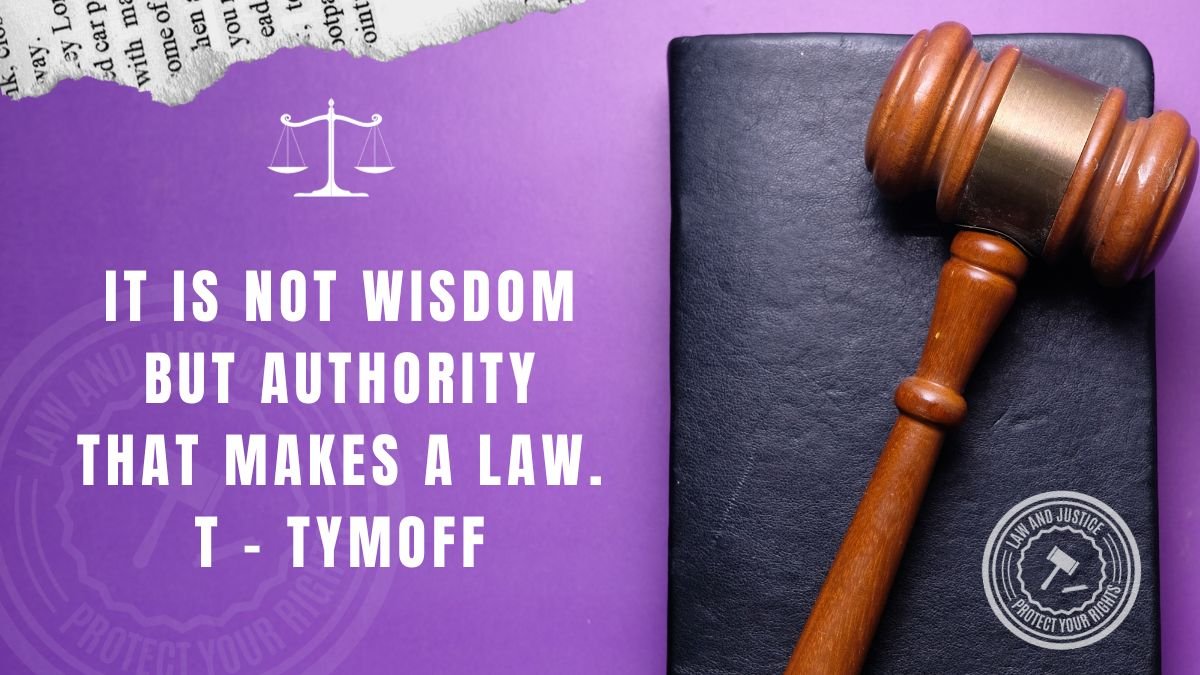It is Not Wisdom but Authority that Makes a Law” – Exploring T. Tymoff’s The age-old adage, “It is not wisdom but authority that makes a law,” encapsulates a thought-provoking perspective on the nature of legal systems. This statement, attributed to T. Tymoff, prompts us to delve into the intricacies of the relationship between wisdom, authority, and the creation of laws. In this article, we will explore T. Tymoff’s viewpoint, examining the implications of prioritizing authority over wisdom in the realm of law.
Table of Contents

Understanding T. Tymoff’s Perspective:
T. Tymoff’s assertion challenges the conventional belief that laws are crafted based on the collective wisdom and rationality of a society. Instead, it suggests that the primary driving force behind the formulation of laws lies in the authoritative power of those in control. To comprehend this perspective, we must consider the dynamics between authority and wisdom within the context of legal frameworks.
must read= Wisdom but Authority
Authority and its Influence on Legal Systems:
In many legal systems, authority is vested in governmental bodies, legislatures, and other institutions responsible for creating and enforcing laws. T. Tymoff’s perspective implies that the decisions made by these authoritative figures may not always be rooted in wisdom or rationality. This raises critical questions about the legitimacy and fairness of laws when they are crafted based on authority alone.

The Dangers of Disregarding Wisdom:
If we accept T. Tymoff’s viewpoint, it leads us to ponder the potential pitfalls of sidelining wisdom in the legislative process. Wisdom, in this context, refers to the collective intelligence, ethical considerations, and foresight that should ideally inform the creation of laws. Ignoring wisdom in favor of unchecked authority may result in legislation that lacks moral grounding, social relevance, and long-term viability.
Historical Examples and Contemporary Relevance:
To further illuminate T. Tymoff’s perspective, it is valuable to examine historical and contemporary examples where authority played a dominant role in shaping laws. Instances of oppressive regimes imposing arbitrary rules without considering the welfare of their citizens serve as stark reminders of the potential consequences when wisdom takes a back seat.
On the other hand, democracies strive to balance authority with the wisdom derived from public discourse, ethical principles, and a commitment to justice. T. Tymoff’s statement invites us to critically assess how various legal systems navigate this delicate equilibrium and whether the scales tip more towards authority or wisdom.

Reevaluating Legal Philosophies:
The exploration of It is Not Wisdom but Authority that Makes a Law- T. Tymoff’s perspective prompts us to reevaluate prevalent legal philosophies. Classical theories such as natural law, legal positivism, and legal realism all offer distinct lenses through which we can analyze the interplay between wisdom and authority in the creation of laws. Each philosophy has implications for how societies conceptualize the legitimacy of legal norms.
Potential for Reform: It is Not Wisdom but Authority
Acknowledging the potential flaws in a system that prioritizes authority over wisdom opens the door to discussions about legal reform. It encourages us to envision a legal landscape where decisions are guided not only by the might of authority but also by the wisdom derived from ethical considerations, inclusivity, and a deep understanding of societal needs.
Conclusion:
In conclusion, T. Tymoff’s assertion, “It is not wisdom but authority that makes a law,” beckons us to reflect on the foundations of legal systems. While authority undeniably plays a pivotal role, sidelining wisdom in the legislative process can have profound consequences for justice, morality, and the well-being of a society. As we navigate the complexities of legal frameworks, it is essential to strike a balance that ensures laws are not merely dictated by authority but are grounded in the collective wisdom that fosters a just and equitable society.




